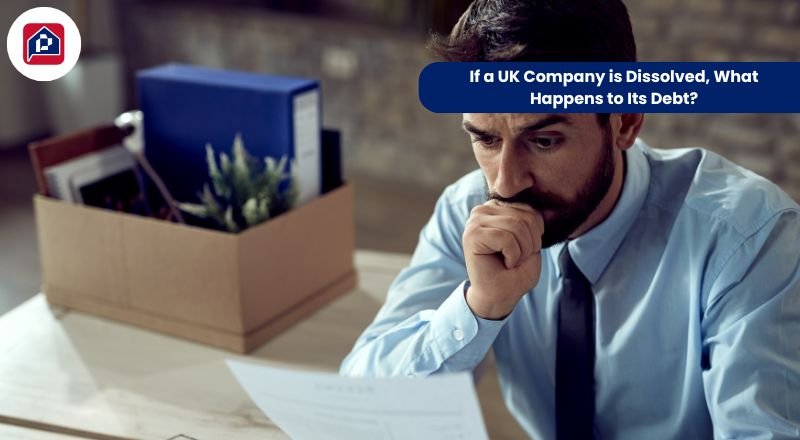If a UK Company is Dissolved, What Happens to Its Debt?

As soon as a UK company legally dissolves due to the process of dissolution of a company, it is not hard to imagine that its debts and liabilities disappear. This is far from the truth. The UK law and financial framework impose some restrictions on what happens to the due debts when the company dissolves. Company dissolution and debt share some important consequences that extend to the directors, the shareholders, and the creditors.
Knowing the legal implications of dissolution is important not just for those responsible for running the business but also for those to whom the company owes money. Let us see what actually happens to a company’s debt after it is struck off the register.
What Is Company Dissolution?
Company dissolution involves official ending a company’s existence in law. In the UK, the operation typically involves being struck off the register with Companies House. Once it has been struck off, then it no longer exists, at least as far as the law can see.
Dissolution may be voluntary or compulsory. Voluntary dissolution normally occurs when directors wish to wind up an inactive or dormant business. Compulsory dissolution, however, may occur if the company fails to comply with statutory requirements, such as filing accounts or confirmation statements.
Regardless of how dissolution occurs, it does not necessarily erase the company’s debts. This is where most creditors and directors are deceived.
The Fate of Debt
Among the most important facts about company dissolution and debt is that dissolution differs from debt forgiveness. The company’s outstanding debts at dissolution remain legally payable. However, because the company no longer operates as a legal entity, creditors may face pragmatic barriers to recouping that which is owing.
If the company is closed and nothing is being done to clear the debts due, the creditors are still able to seek payment. In most cases, they can ask the court to have the company re-registered with the Companies House. After being re-registered, the company’s legal position is re-established, and creditors are able to seek recovery of debts once again.
Personal Liability of Directors & Shareholders
One consideration is whether shareholders or directors are personally responsible for company debt. In most cases, a limited company arrangement protects individuals from personal responsibility. Exceptions do, however, exist.
Directors may be held personally responsible if:
- They provided personal guarantees on company credit facilities or loans
- They were negligent or fraudulent, particularly in the period leading to dissolution
- They misapplied company funds or failed to act in good faith for the benefit of the creditors
By way of illustration, if a director pays certain particular creditors and others not before presenting the petition for dissolution, this may be seen to be misconduct. Creditors in such cases have recourse against the director personally.
Restoring a Dissolved Company
One of the main concerns a creditor may have about company dissolution and debt is how they will recover their losses. If a creditor wishes to recover against a dissolved UK company for unpaid debt, they may apply for administrative restoration (if they were a director or shareholder) or court-ordered restoration (if they are a creditor). Restoration typically entails making an application within six years of the date of dissolution and proving that the company still has unpaid obligations.
After restoration, the business is treated as if it never dissolved. The legal fiction allows the creditors to enforce judgments, bring proceedings, or recover goods and assets the company previously held.
Restoration also leaves the door open to regulatory inquiries and legal proceedings in the event that there were any malpractices by the directors of the company.
Implications for Creditors & Investors
Company dissolution is a setback from the creditor’s perspective, but not an impasse. There are avenues provided by the law whereby creditors can compel dissolved companies to account. For this purpose, however, creditors must act quickly. The longer time gaps, the less feasible it is to resuscitate a company, and proof of debt can become harder to establish.
Investors need to be aware as well. If they have invested in a company that collapses owing debts, their capital could be lost forever. This is especially the case for unsecured investors who are behind secured creditors in any legal claim.
Shuttering A Company With Debts: What You Need To Know
Directors who are about to dissolve a company with debts have to do so with complete knowledge of their legal requirements. Directors must:
- Pay off as many debts as possible before applying for dissolution
- Notify all creditors of the intention to dissolve
- Avoid preferential treatment of creditors
- Maintain financial records and correspondence for a few years after dissolution
Not doing so risks restoration and legal claims and can damage the director’s future prospects of serving in other companies.
Conclusion
UK company dissolution and debt collide in a complex and multilayered legal environment. Dissolution of a company does not make its debts disappear. There are remedies at law available to creditors, directors can be personally liable in some circumstances, and dissolved companies can be revived to satisfy outstanding liabilities.
For anyone involved in or affected by the winding up of a company, gaining professional financial and legal advice is not only prudent—it is required to protect interests and comply with UK law.